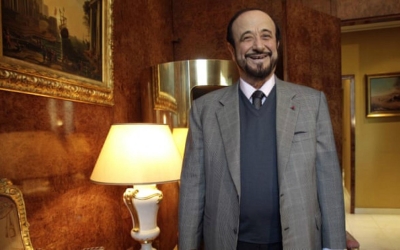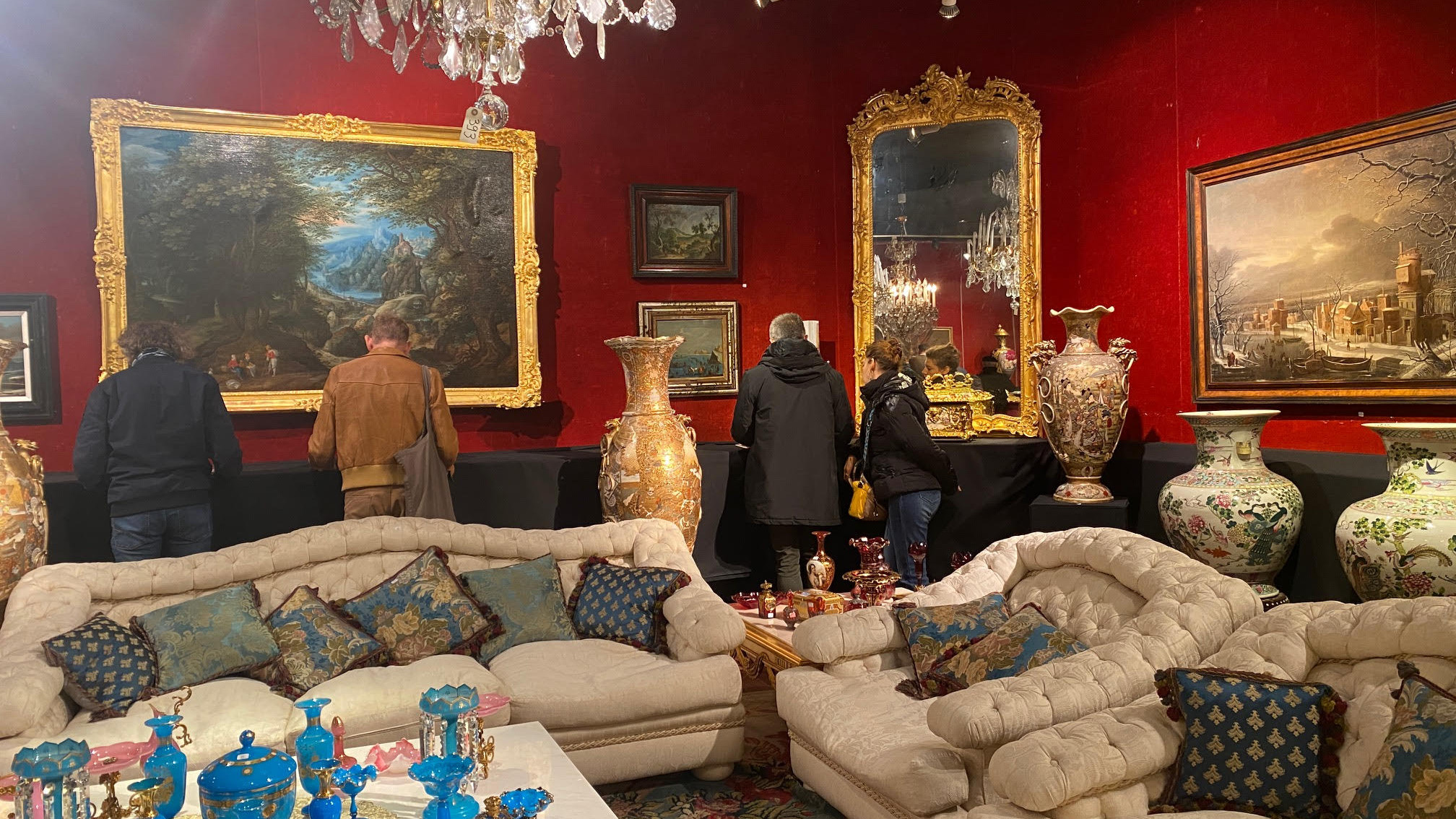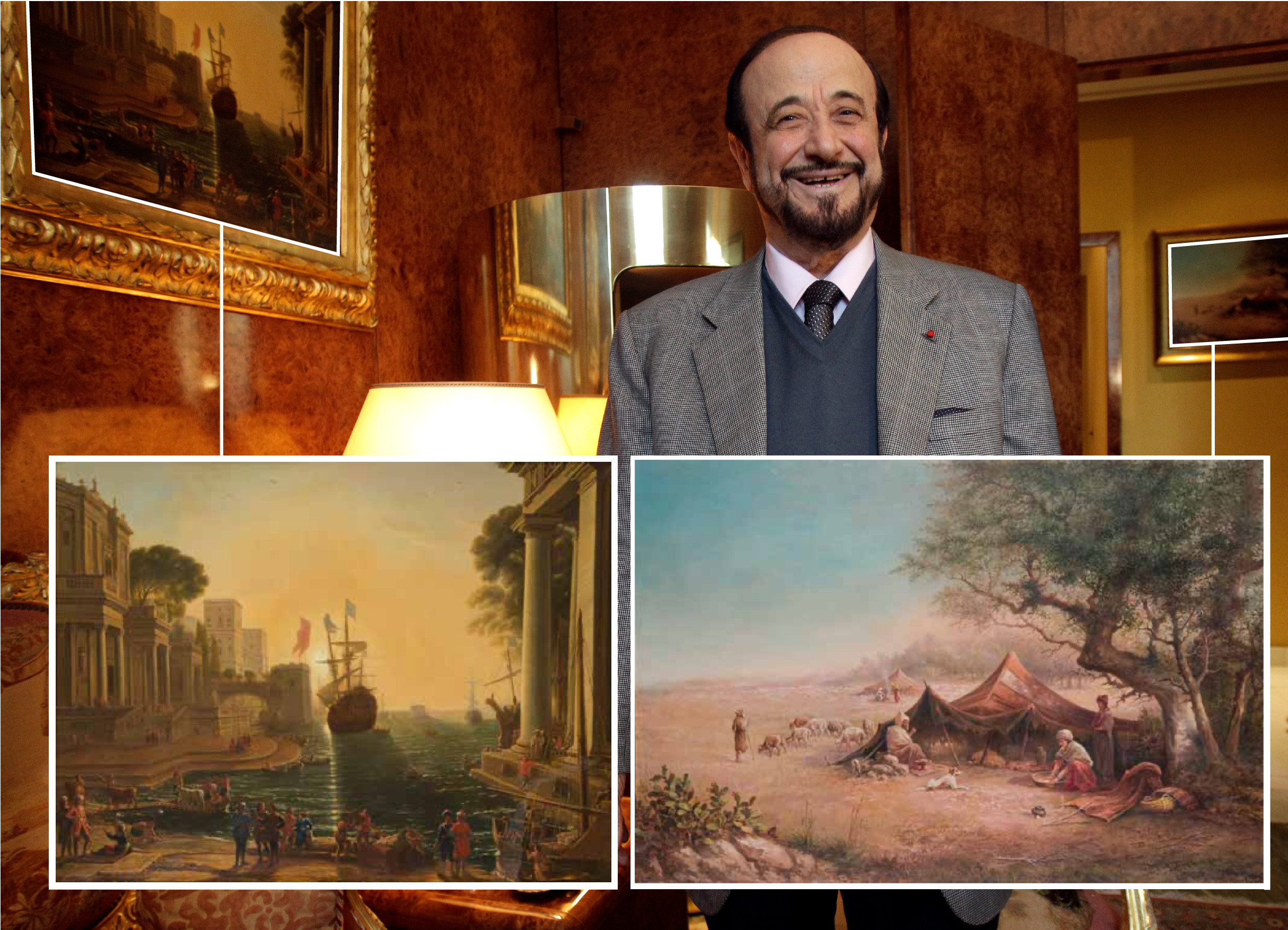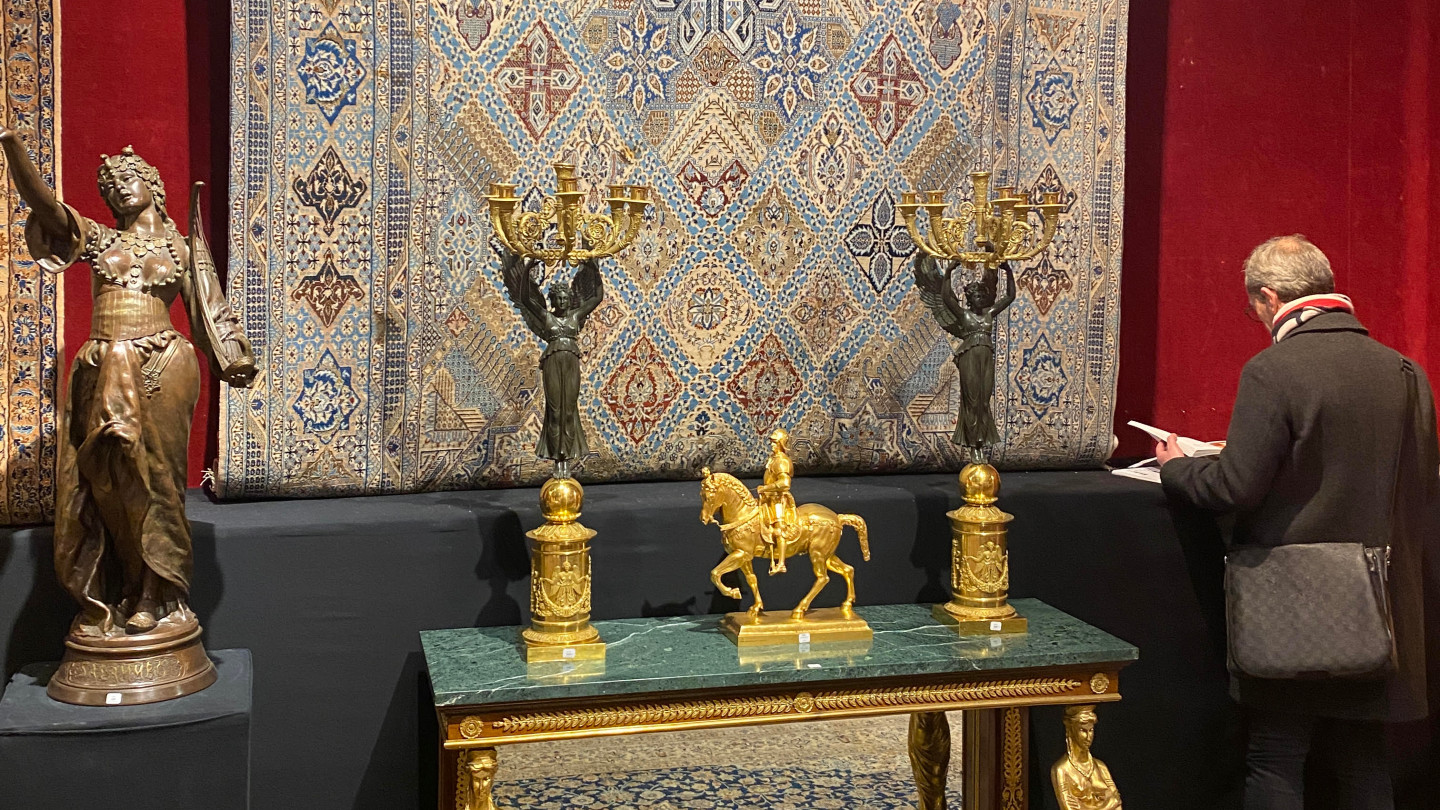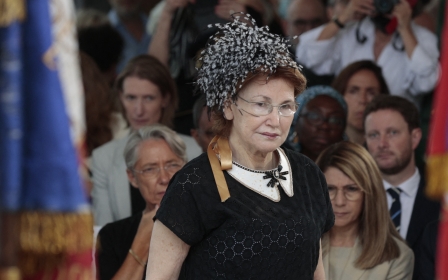Rifaat al-Assad's furniture auctioned off in France
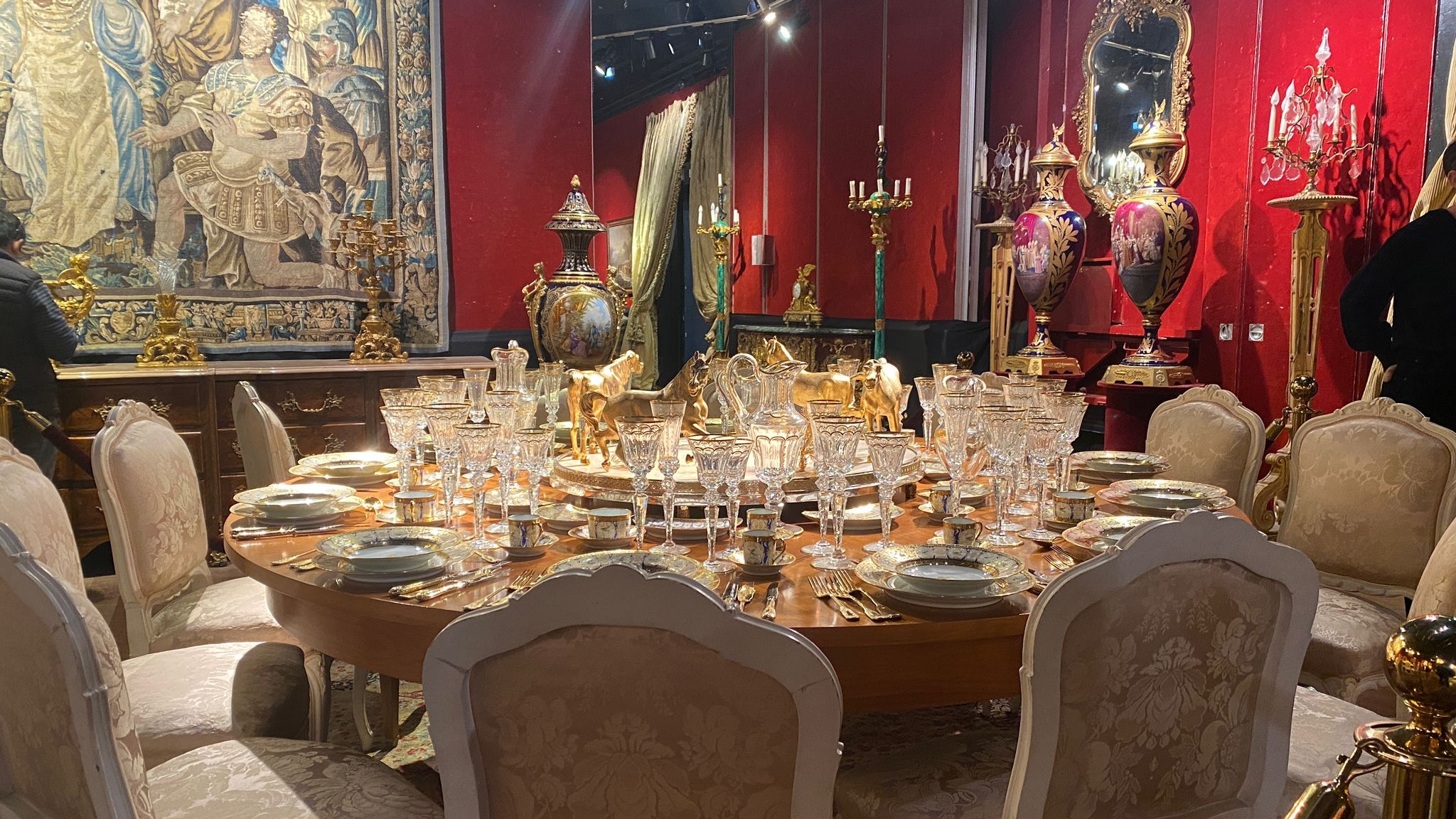
Catalogues in hand, excited art dealers bustled around the first floor of Paris’s Hotel Drouot, the biggest art marketplace in France.
In a special sale by French auction house Ader, 536 luxury lots - including sofas, tables, paintings, chandeliers, porcelain dinner sets and rugs - were laid out across four rooms, up for auction over the next two days.
The items came simply from a “grand townhouse in Avenue Foch”, an opulent area in West Paris, according to Ader.
Nowhere amongst the intricate detailing of each luxury piece did they mention that they came from the former mansion of Bashar al-Assad’s 85-year-old uncle, the former Syrian vice-president, Rifaat al-Assad, who left France for Syria last year.
The property, reportedly bought with embezzled Syrian government money, was once one of many he owned, Middle East Eye has confirmed, building on reports by Le Journal du Dimanche and L’Orient le Jour.
But whilst the state could seize the townhouse, the furniture inside fell through a legal loophole, meaning an anonymous seller would go on to sell at least €3.3m ($3.57m) worth of pieces, according to Le Quotidien de l'Art.
Few of the art dealers and punters walking through the exhibition halls last Wednesday seemed to realise what they were ogling, however.
“I wanted to call you right away,” an elegantly dressed woman in her fifties whispered, phone to her ear. “You have to come. It's all beautiful."
In the midst of the hubbub, though, two young Syrians - who arrived in France in 2015, fleeing the Assad government and its brutal repression of the opposition - understood what surrounded them.
“All this belongs to us Syrians. The Assad clan plundered it,” said one of them in a low voice, asking to remain anonymous for fear of repercussions. “But no one is saying anything.”
Contacted several times, Ader did not disclose the identity of its client and refused to confirm the provenance of the goods. “The information is confidential and the sale complies with the relevant laws,” it told MEE.
War crimes and corruption
Rifaat al-Assad was exiled from Syria in 1984 by his brother Hafez after leading a failed coup attempt against him.
Since then, he has lived in France, reportedly offering intelligence to France about terrorist organisations in exchange for state protection.
In 2013, Swiss authorities opened a war crimes investigation into his alleged role in the deaths of “several thousand people” during massacres in Hama and another in Tadmor the early 1980s, accusations he denies.
In 2017, Spanish authorities also seized more than 500 properties worth $736m also belonging to him.
Assad was sentenced to four years in prison in France in June 2020 for illegally using Syrian state funds to build a French real estate empire worth at least €90m ($9.7m). His assets were confiscated.
When a top French court upheld the decision in September 2022, Assad left for Syria after more than 30 years in exile, having been allowed to return by his nephew Bashar. “Disappointed” with France, he returned the Legion d’Honneur president Francois Mitterrand had awarded him in 1986.
‘For his excellency REA’
Half of the items in the Ader catalogue sold on day 0ne, for €1,673,000 ($1.8m), according to available data. Calculations for both days done by Le Quotidien de l'Art suggest the sum for both days was €3.3m ($3.57).
Some of the goods auctioned off - including several fancy sofas and armchairs - are recognisable from pictures taken during interviews Assad gave before his conviction. Ader’s catalogue also includes two dinner sets made “for his excellency REA” - Rifaat el-Assad.
MEE has also identified two of the paintings up for auction. One by French 17th century artist Claude Gellee, which sold for €3,000 ($3,200), and another by 19th century Russian artist Gaspard de Toursky, which went for €1,200 ($1,298).
The townhouse on Avenue Foch was seized by French authorities following the court decision in 2022. The furniture inside was not.
In accordance with a new legal mechanism set up in France in July 2021 for the restitution of assets obtained via corruption, the value of the townhouse must somehow be returned "to the people" of Syria. (How to do that remains a headache for Paris. France in 2012 cut off diplomatic relations with Syria, whose government is under international sanctions.)
But French authorities say they were not involved in the furniture sale. The Agency for the Management and Recovery of Seized and Confiscated Assets, a French public administrative body that sells off assets taken by the state, told MEE it was “not behind the auction organised by Ader”.
“It was not possible to find out how the furniture was acquired,” said Chanez Mensous, head of advocacy and litigation on illicit financial flows at French NGO Sherpa, which has been a civil party in the French proceedings against Rifaat al-Assad since 2013.
“The investigations [into the French case] were very long,” said Mensous, “the procedures started back in 2013. For the acquisition of real estate there are legal provisions that apply, but this is not the case for furniture.
“Unlike goods that have been seized by the courts, in this case, the profit from the sale will go to the owner of these goods. It should be remembered that this sale is technically not illegal,” she added. Ader received 25 percent of auction profits. Where the rest of it went is unknown.
Anonymous seller
In room number 9 of Hotel Drouot, prices leapt on 13 January, the auction’s second day, as bidders went for higher value items.
“What do we have here?” a young auctioneer asked onlookers, wielding his hammer, having sold a set of 70 crystal glasses for €5,000 ($5,400).
Lot 294. “A flat desk from the Napoleon era,” he said, excitedly. “We start at €1,000.”
Quickly, hands shot up. On the phone, others pushed the price higher. In two minutes, the desk sold for €10,000, ten times its initial valuation. The buyers remain anonymous, so does the seller.
Rifaat al-Assad’s French counsel Elie Hatem denied that the goods auctioned in Paris belonged to his client.
“He is currently in Damascus, complying with both French law and that of his country. Consequently, he does not intend to reclaim any of the property confiscated from him,” he told MEE, adding that Assad is attempting legal action in the European Court of Human Rights to overturn the final ruling in the French case.
“The Syrian state will proceed with a request for the restitution of any property declared to have been diverted from the country as soon as this [ECHR] case is finalised,” he said.
According to Hatem, “the goods auctioned by Ader come from the third floor of the Avenue Foch townhouse, which Mr al-Assad gave up to his ex-wife a long time ago in the context of painful divorce proceedings. And now she is probably selling those goods to make a profit, without my client’s approval.”
Line al-Khayer and Raja Barakat, two ex-wives of Rifaat al-Assad, each had their own apartments in the building, which they reached by separate elevators designed to prevent them from bumping into each other. Elie Hatem did not specify which of the two he was alleging were behind Ader’s auction.
Then there’s Siwar al-Assad, the son of Rifaat and Barakat. Siwar has served as Rifaat’s spokesperson from London, where he heads the Aramea Foundation, which says it helps Syrian refugees and works for the protection of the historical heritage of the Levant region.
Siwar did not miss a single day of hearings during the 2022 trial in Paris. He is also a business ally to his father. "His name appears as a beneficiary in all shell companies created by Rifaat al-Assad to conceal the source of his funds,” said an insider with in-depth knowledge of Rifaat al-Assad's case in France, who asked to remain anonymous.
Khayer and Barakat also appear in the network of companies mentioned in the French investigations alongside Siwar al-Assad. None of them could be reached for comment.
‘Unpleasant surprises’
“I fear that this money will ultimately go back into the pockets of the Assad clan,” Franco-Syrian activist and jurist Firas Kontar told MEE. “Of course the auction house organising this sale has the right to do so, but have these people asked themselves the question of morality and of their responsibility? They’re hiding behind the law, that's all.”
“If the conviction of Rifaat al-Assad marked a considerable victory in the fight against ‘probity breaches’, the sale of these assets unfortunately adds to the many unpleasant surprises following this conviction,” Vincent Brengarth, Sherpa’s French counsel, told MEE.
“In view of what the [French] investigations have revealed about the fraudulent way in which Rifaat al-Assad was able to build up a large part of his assets, this shows that anti-corruption justice can still be improved. Even if a large number of goods were confiscated, it is clear that the auctioned goods, which are of great value, escaped justice.”
This article is available in French on Middle East Eye French edition.
Middle East Eye delivers independent and unrivalled coverage and analysis of the Middle East, North Africa and beyond. To learn more about republishing this content and the associated fees, please fill out this form. More about MEE can be found here.


